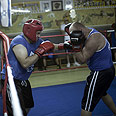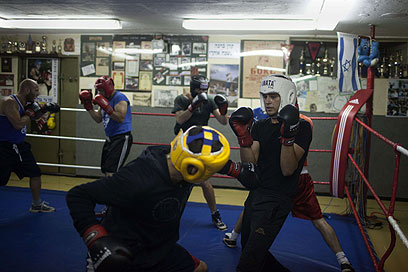
Boxing club aims to topple barriers
Jerusalem club offers rare opportunity for Israelis, Palestinians to meet twice a week to practice boxing, far from the realities of city at heart of conflict
Within minutes it was all over, and the two youths briefly embraced before heading off in separate directions.
This was no political battle - just a regular bout of sparring between youngsters from a local Jerusalem boxing club that is trying to break down barriers between the two peoples.
The club, based in a converted underground bomb shelter in a ramshackle district of west Jerusalem, offers a rare opportunity for Palestinians and Israelis to meet twice a week to practice boxing, far from the realities of this city which has been at the heart of the conflict since 1967.

'Everyone who comes here feels at home' (Photo: AFP)
Known simply as the Jerusalem Boxing Club, it was set up in 1981 by Gershon Luxemburg, a champion boxer who emigrated from the Uzbek city of Tashkent in the former Soviet Union in 1972.
"The club is open to everyone – to Jews and Arabs, women and men, religious people and secular people – it's for everyone and everyone can come!" says Luxemburg in heavily accented Hebrew.
"And everyone who comes here feels at home," he adds, his enthusiasm for the venture still irrepressible after 30 years.
A stocky, bearded man wearing a traditional Jewish skullcap, Luxemburg says the club seeks not only to promote acceptance and tolerance of the other, but also to nurture friendships.
"It's not about everyone just getting on - it is much more than that: we are friends here, like one body," he says. "It's not just people walking in and saying 'hi' and 'bye'."
The entrance to the club is unobtrusive - a single door in a shabby concrete block set in the middle of a car park opens onto a set of stairs and a huge poster of American boxing legend Muhammad Ali.
Down below, the walls are lined with photographs and certificates that tell countless stories of those who have trained there.
In the airless basement, temperatures are high and the steady thud of boxing gloves competes with the whirr of electric fans pushing the sweaty air around.
'Opportunity to meet without fear'
Ramzi Srour, a 19-year-old Palestinian from Jabel Mukaber in east Jerusalem, is a "veteran" of the club, where he has been training since he was eight years old.
"Gershon is like a father to everyone here at the club, whether they are Jews or Arabs," he says.
Down among the punch bags, all political differences are set aside, he tells AFP, clad in a black T-shirt and long sweat pants.
"This is just sport," he insists, in an interview between sessions in the ring.
"Maybe outside this place they are our enemies, but our relationship in the outside world is very different to our relationship down here."
Srour dismisses out of hand the suggestion that he fights harder when faced with an Israeli opponent in the ring.
"I want to win for the club and for myself, and not because I am an Arab," he insists. "I'm competing against both Arabs and Jews and all I want is to win."
Luxemburg says he started the club as a result of his experience growing up in Tashkent in what is now Uzbekistan.
"My family came from the former Soviet Union where more than 100 peoples live together, and here in Israel it has given me a different perspective," he says.
"I can see how very easily you can get on with everyone in this world," Luxemburg says.
His liberal outlook is not shared by a majority of Russian-speaking immigrants, many of whom support right-wing Jewish nationalist parties and are perceived as hostile toward Arabs, as typified by the outlook of hawkish Moldovan-born Foreign Minister Avigdor Lieberman.
Prominent among the young boxers is Akiva Finkelstein, a religiously observant Jewish 16-year-old who has won Israel's youth boxing title seven times.
Like Srour, he says his drive to win comes from desire a "to be the best", and has nothing to do with whether his opponent is a Jew or an Arab.
He sees boxing as an excellent way of building bridges between the two peoples.
"I think if everybody was more together – like here, we are like one people – the relationship between us and the Arabs would get much better," he said.
"But not everybody does boxing."
Luxemburg agrees. The message he wants to get across to politicians on both sides of the political divide is that simply meeting people is a powerful way to break down barriers.
"Give us the opportunity to meet without fear," he says.
"It doesn't matter in what field – whether it's through sports or music or culture -- just let us meet so you can see that the person standing in front of you is not a wolf or a dog or some kind of animal!
"You can see straight away that this person is a human being."
- Follow Ynetnews on Facebook










